Charles E W Bean, Diaries, AWM38 3DRL 606/276/1 - 1928-1937 - Part 1
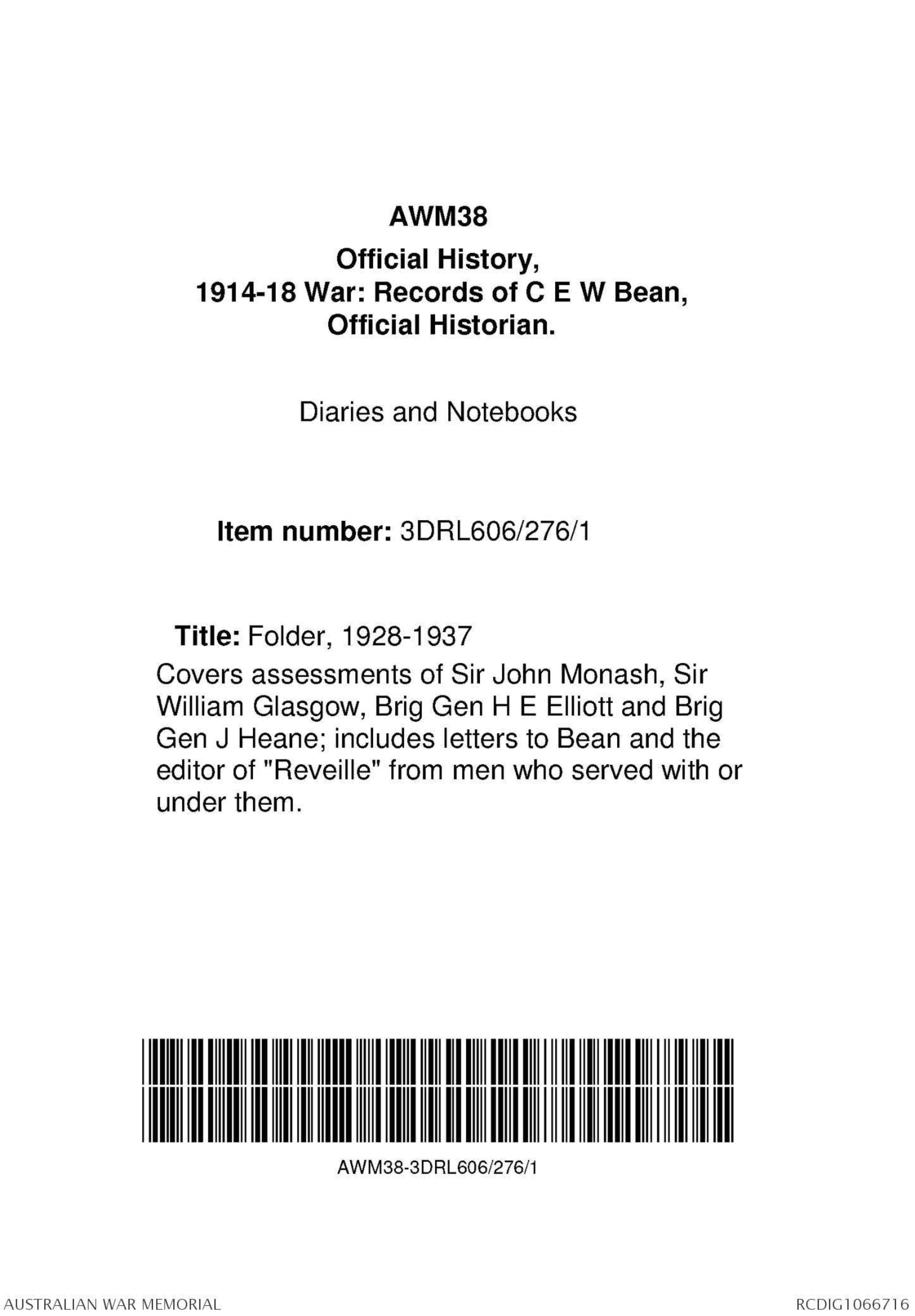
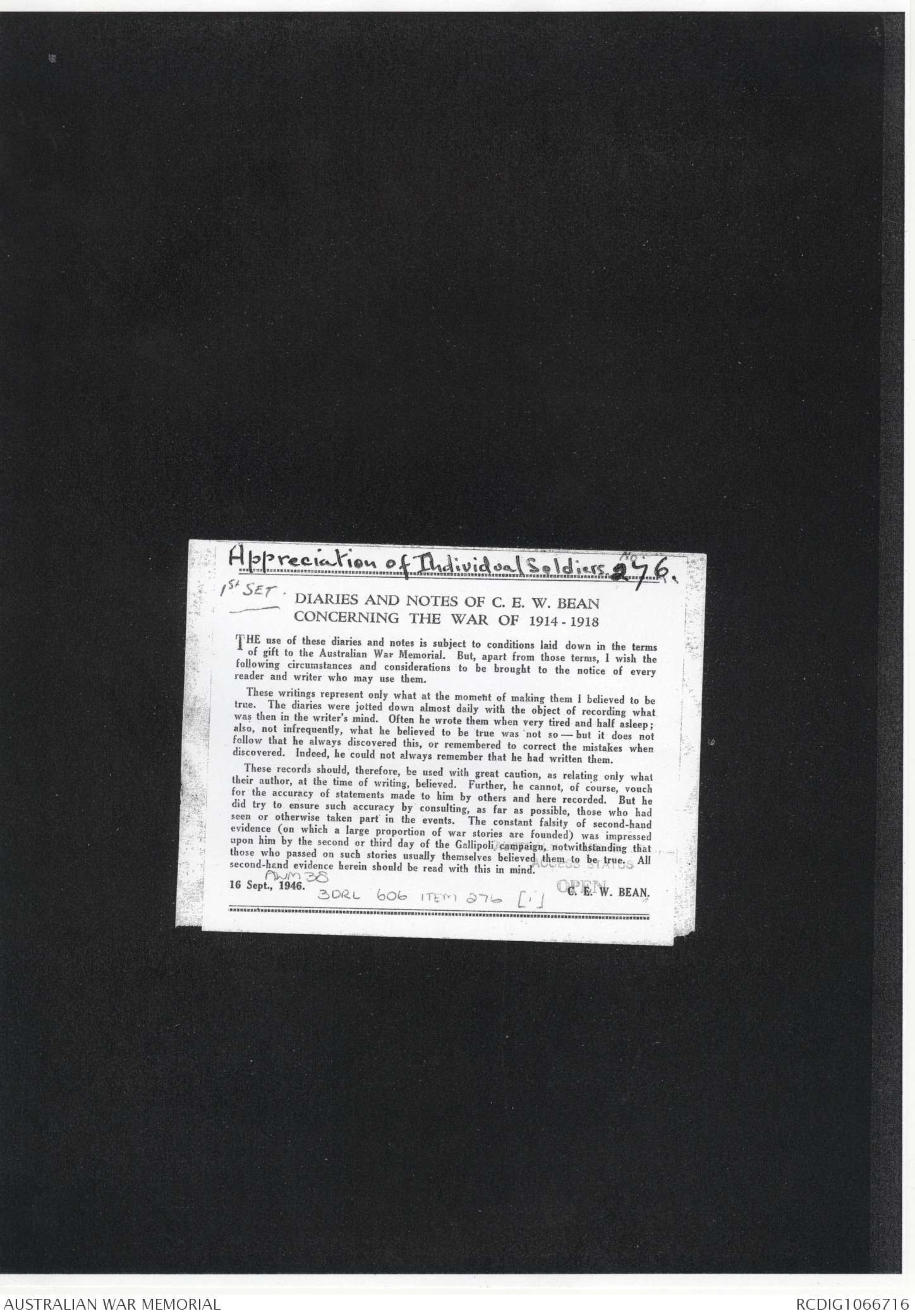
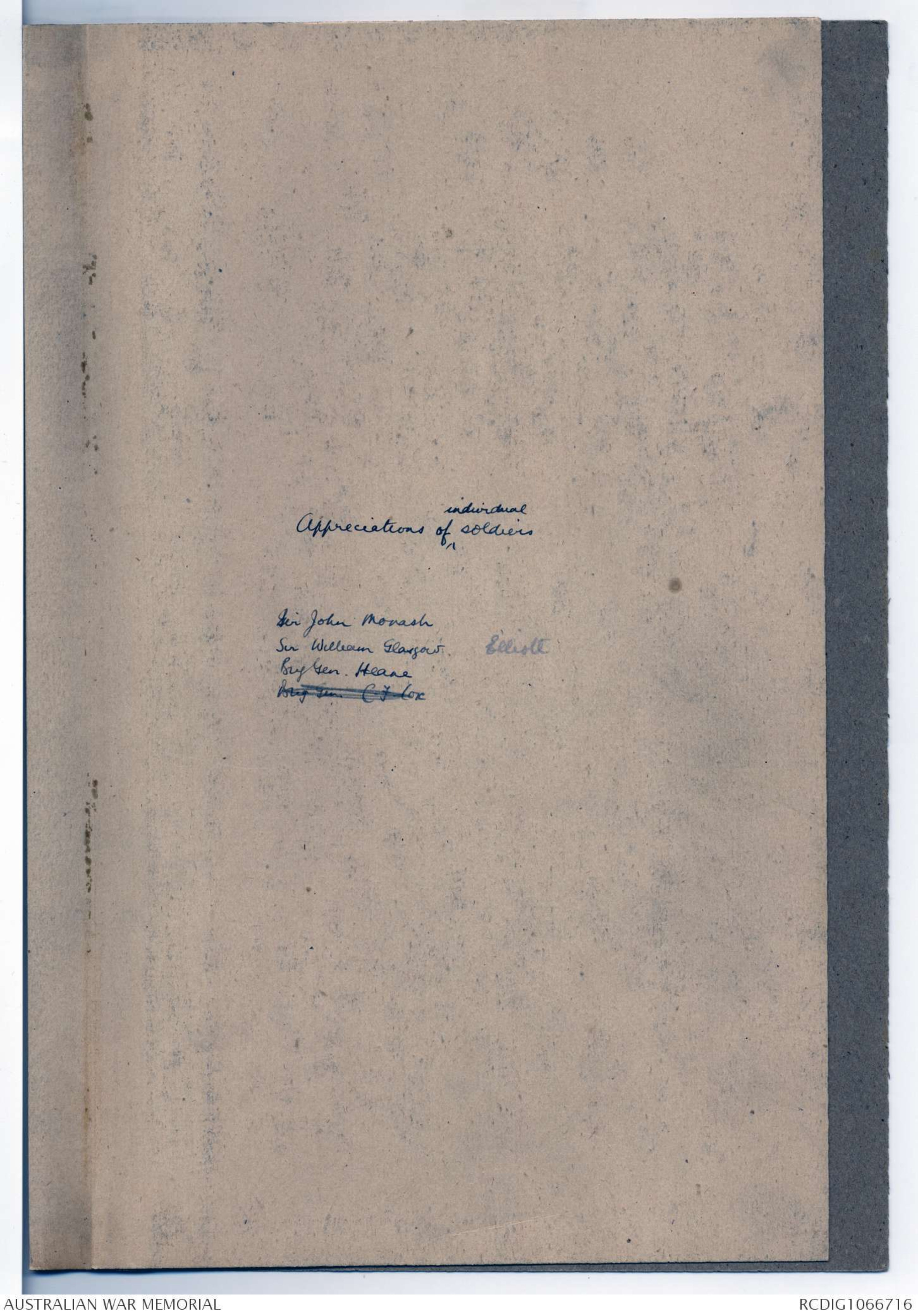
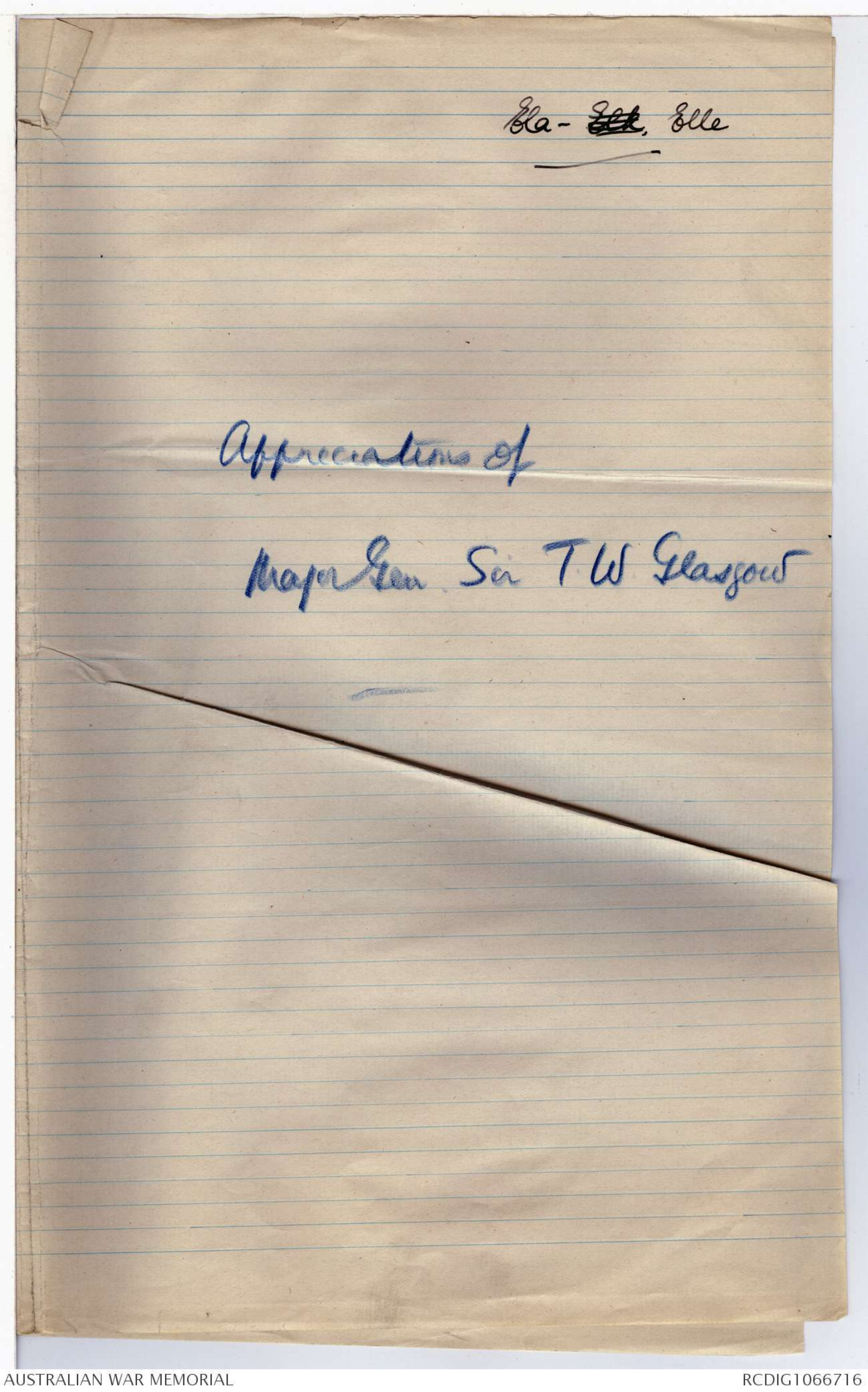
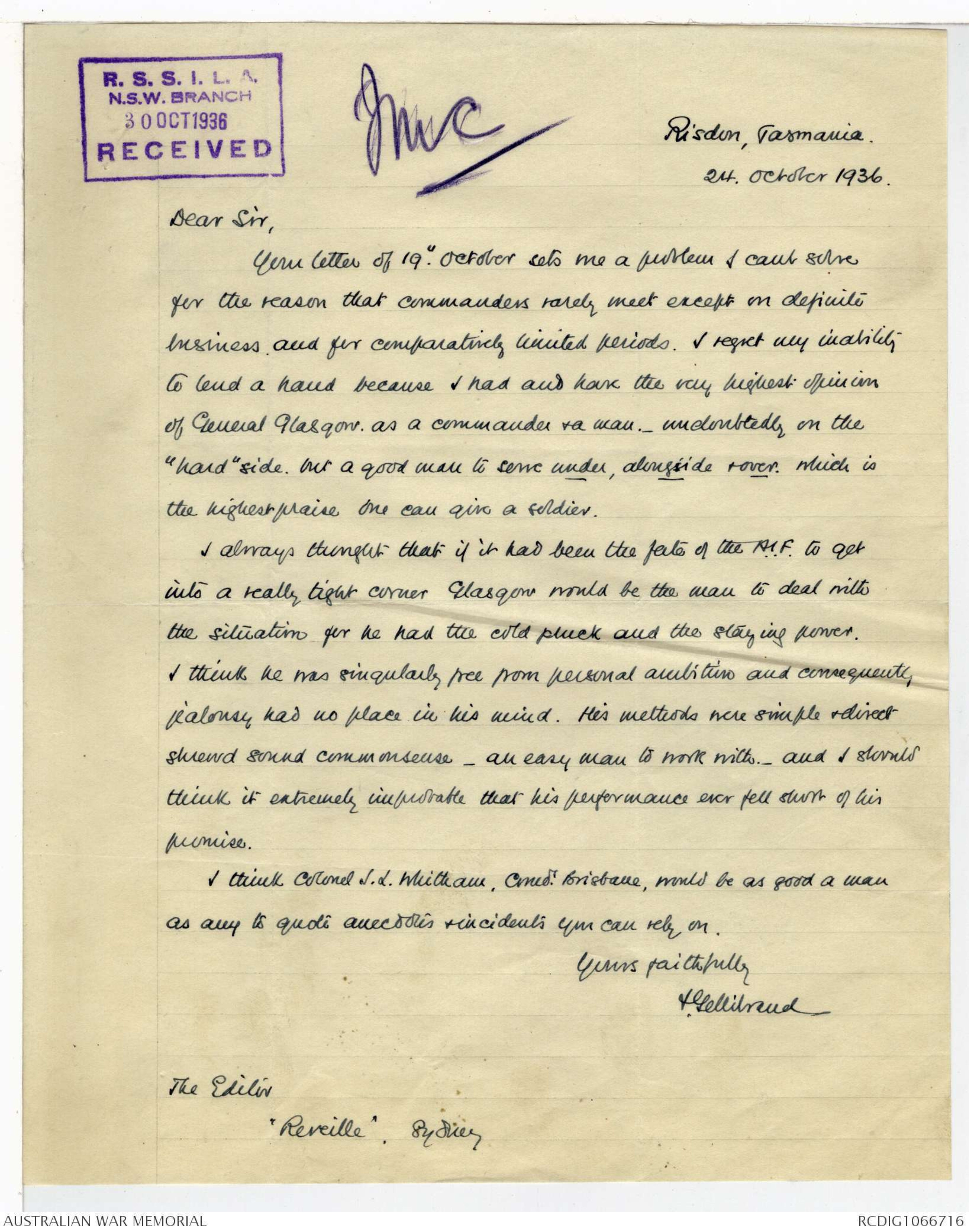
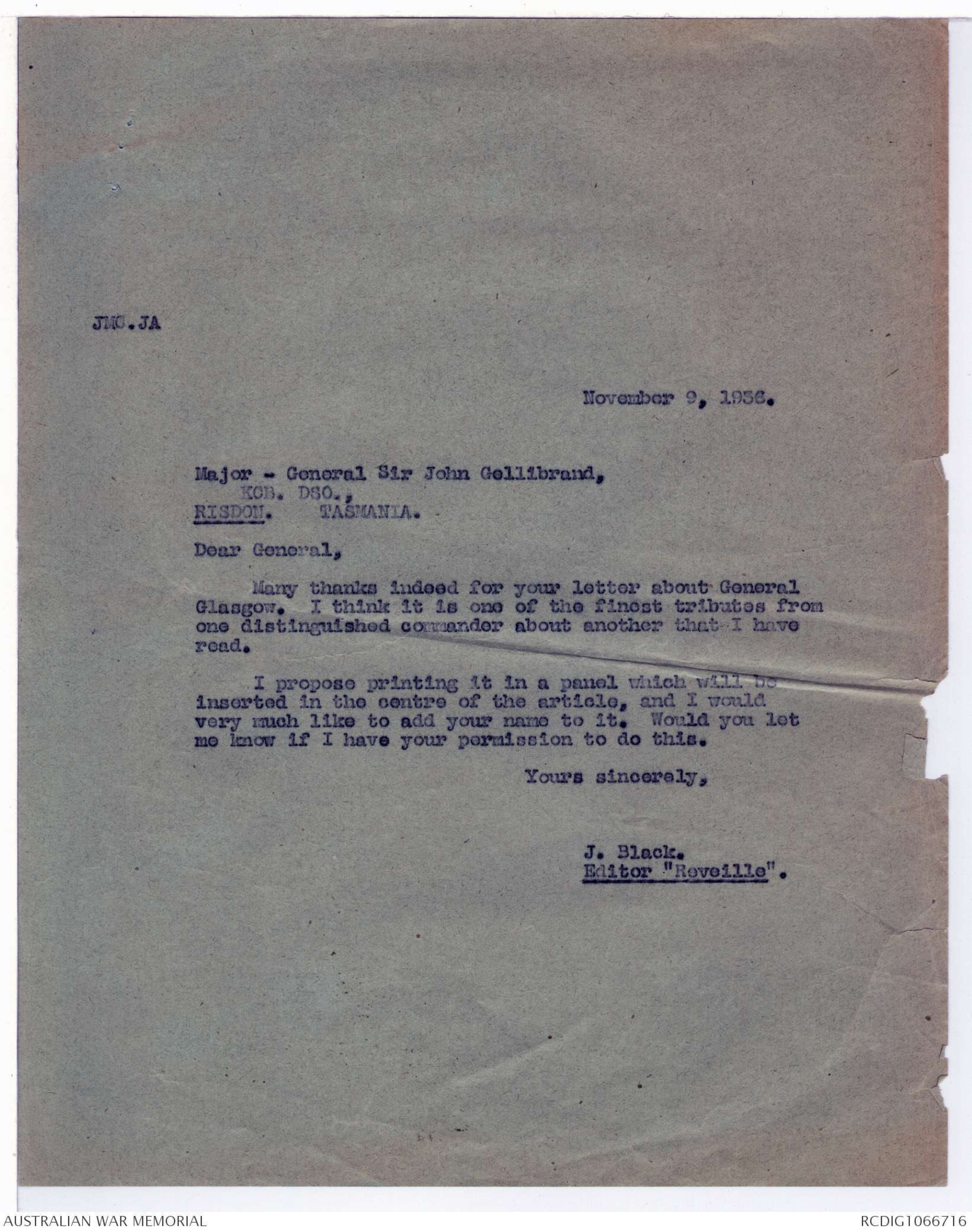
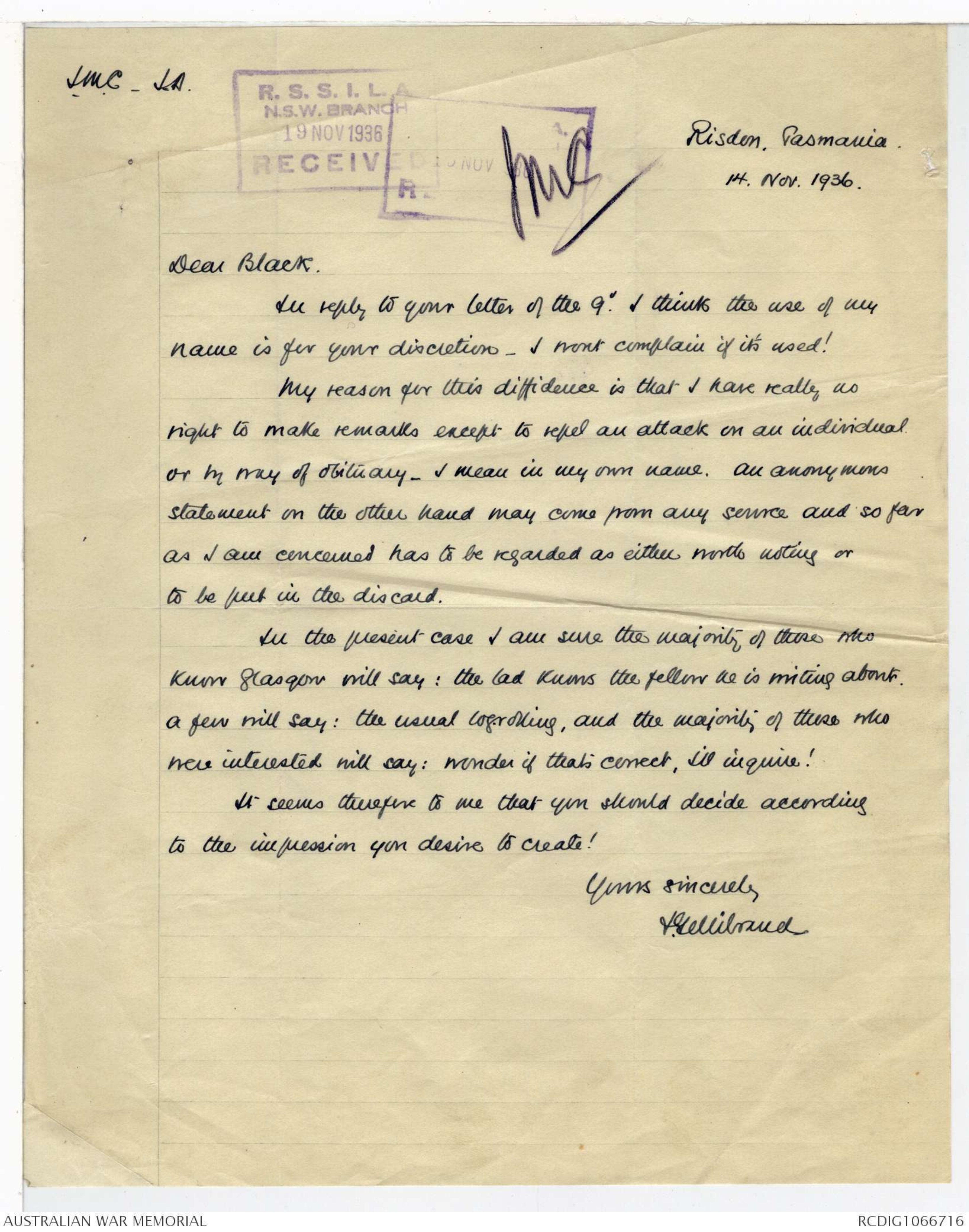
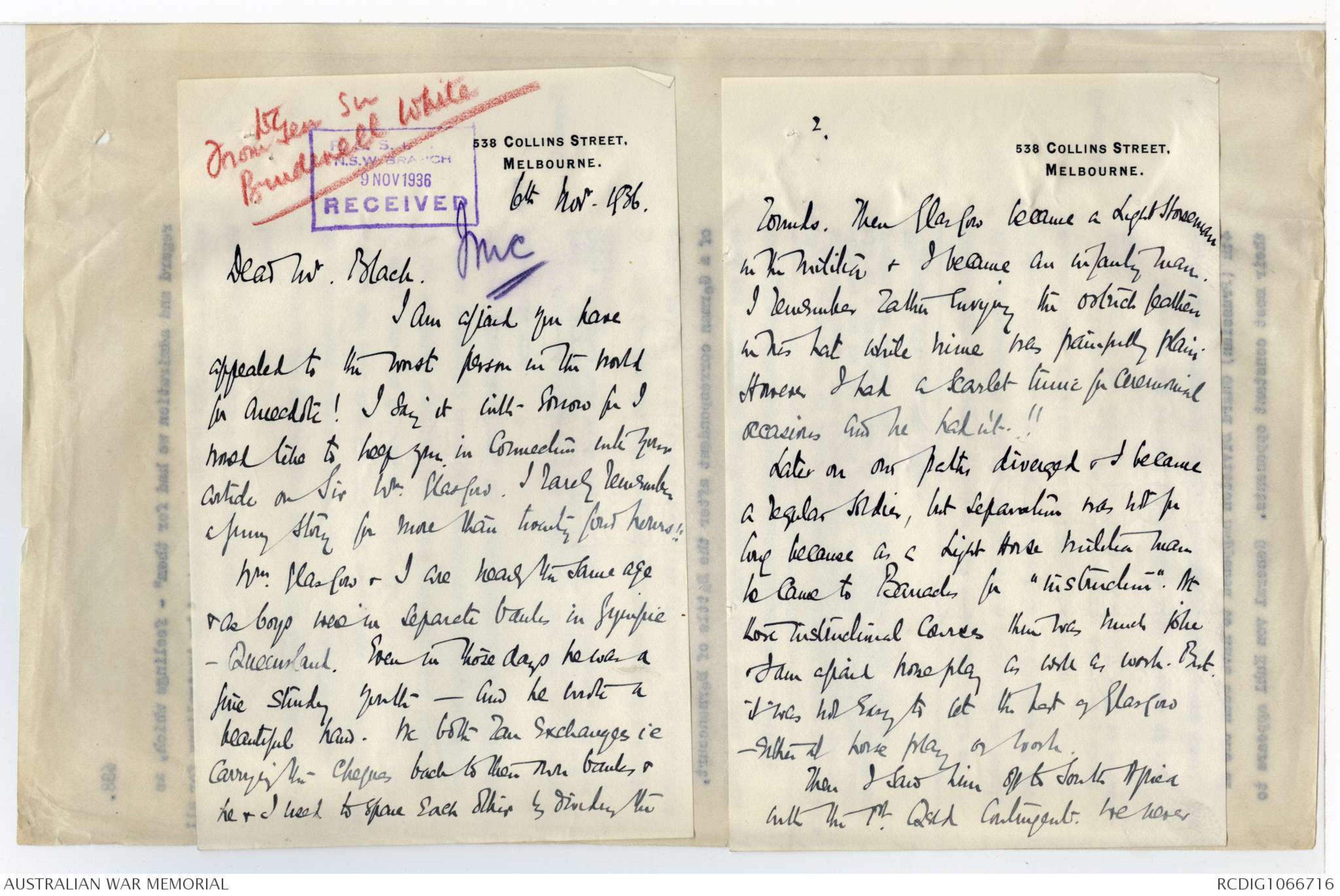
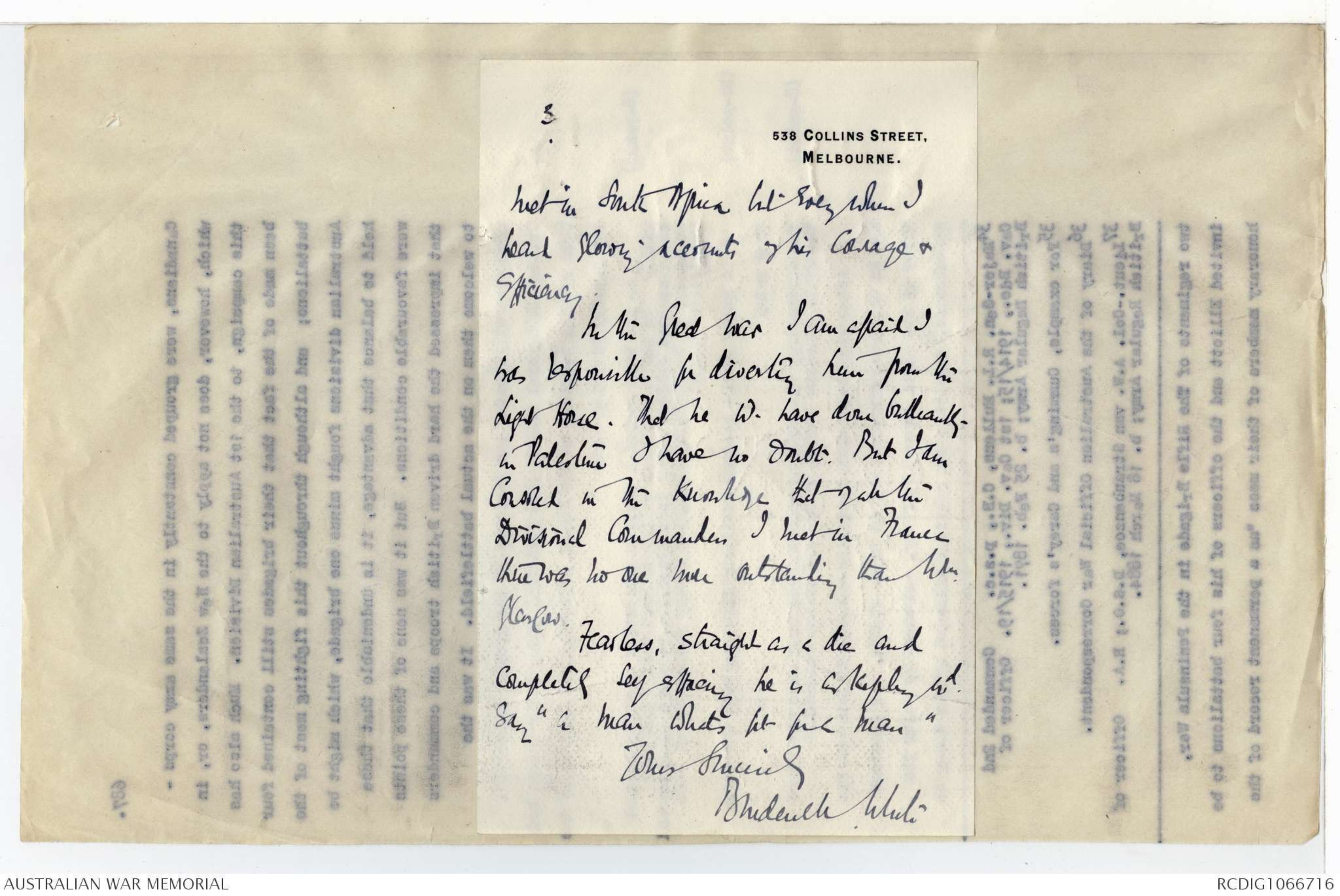
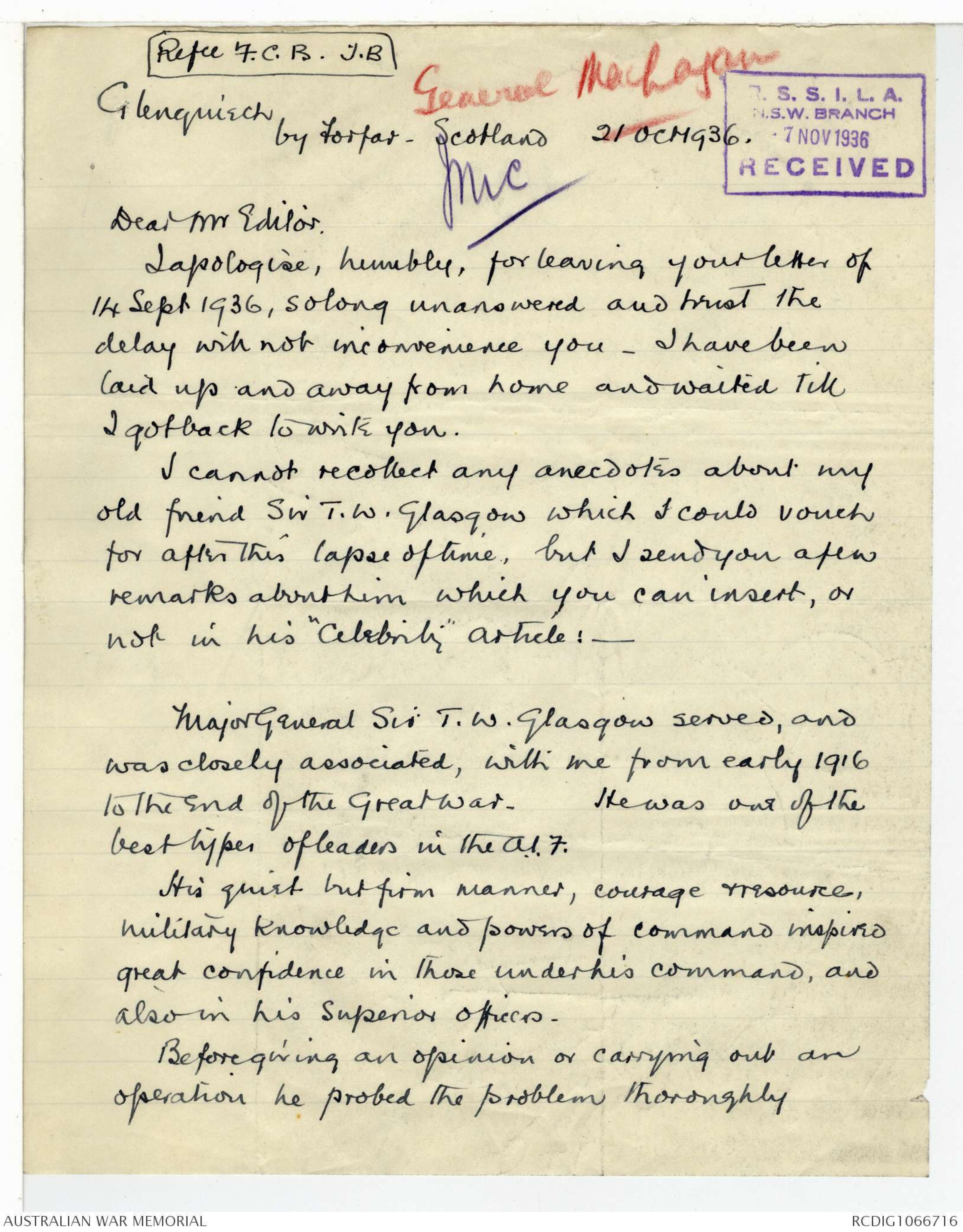
AWM38
Official History,
1914-1918 War: Records of C E W Bean,
Official Historian.
Diaries and Notebooks
Item Number: 3DRL606/276/1
Title: Folder, 1928-1937
Covers assessment of Sir John Monash, Sir
William Glasgow, Brig Gen H E Elliott and Brig
Gen J Heane; includes letters to Bean and the
editor of "Reveille" from men who served with or
under them.
AWM38-3DRL606/276/1
Appreciation of Individual Soldiers No. 276
1st SET
DIARIES AND NOTES OF C. E. W. BEAN
CONCERNING THE WAR OF 1914-1918
THE use of these diaries and notes is subject to conditions laid down in the terms
of gift to the Australian War Memorial. But apart from these terms, I wish the
following circumstances and considerations to be brought to the notice of every
reader and writer who may use them.
These writings represent only what at the moment of making them I believed to be
true. The diaries were jotted down almost daily with the object of recording what
was then in the writer's mind. Often he wrote them when very tired and half asleep;
also, not infrequently, what he believed to be true was not so - but it does not
follow that he always discovered this, or remembered to correct the mistakes when
discovered. Indeed, he could not always remember that he had written them.
These records should, therefore, be used with great caution, as relating only what
their author, at the time of writing believed. Further, he cannot, of course, vouch
for the accuracy of statements made to him by others and here recorded. But he
did try to ensure such accuracy by consulting, as far as possible, those who had
seen or otherwise taken part in the events. The constant falsity of second-hand
evidence (on which a large proportion of war stories are founded) was impressed
upon him by the second or third day of the Gallipoli campaign, notwithstanding that
those who passed on such stories usually themselves believed them to be true. All
second-hand evidence herein should be read with this in mind.
AWM 38
16 Sept., 1946. C. E. W. BEAN.
ACCESS STATUS
OPEN
3DRL 606 ITEM 276[1]
Appreciation of ^individual soldiers
Sir John Monash
Sir William Glasgow. Elliott
Brig Gen. HeaneBrig Gen C. F. Cox
Ela - Elk . Elle
Appreciations of
Major Gen. Sir T W Glasgow
R.S.S.I.L.A.
N.S.W. BRANCH
30 OCT 1936
RECEIVED
JMC
Risdon, Tasmania.
24. October 1936.
Dear Sir,
Your letter of 19th October sets me a problem I cant solve
for the reason that commanders rarely meet except on definite
business and for comparatively limited periods. I regret my inability
to lend a hand because I had and have the very highest opinion
of General Glasgow, as a commander & a man, - undoubtedly on the
"hard" side. but a good man to serve under, alongside & over, which is
the highest praise one can give a soldier.
I always thought that if it had been the fate of the A.I.F. to get
into a really tight corner Glasgow would have been the man to deal with
the situation for he had the cold pluck and the staying power.
I think he was singularly free from personal ambition and consequently
jealousy had no place in his mind. His methods were simple & direct
shrewd sound commonsense - an easy man to work with - and I should
think it extremely improbable that his performances ever fell short of his
promise.
I think Colonel J. L. Whitham, Cmdr. Brisbane, would be as good a man
as any to quote anecdotes & incidents you can rely on.
Yours faithfully,
J. Gellibrand
The Editor
"Reveille", Sydney
JMC.JA
November 9, 1936
Major-General Sir John Gellibrand,
KCB, DSO.,
RISDON. TASMANIA.
Dear General,
Many thanks for your letter about General
Glasgow. I think it is one of the finest tributes from
one distinguished commander about another that I have
read.
I propose printing it in a panel which will be
inserted in the centre of the article, and I would
very much like to add your name to it. Would you let
me know if I have your permission to do this.
Yours sincerely,
J. Black.
Editor "Reveille".
J.M.C.-J.A.
R.S.S.I.L.A.
N.S.W. BRANCH
19 NOV 1936
RECEIVED
JMC
Risdon, Tasmania
14. Nov. 1936.
Dear Black,
In reply to your letter of the 9th I think the use of my
name is for your discretion - I won't complain if it's used!
My reason for this diffidence is that I have really no
right to make remarks except to repel an attack on an individual
or by way of obituary - I mean in my own name. An anonymous
statement on the other hand may come from any source and so far
as I am concerned has to be regarded as either worth noting or
to be put in the discard.
In the present case I am sure the majority of those who
know Glasgow will say: the lad knows the fellow he is writing about,
a few will say: the usual log-rolling, and the majority of those who
were interested will say: wonder if that's correct, I'll inquire!
It seems therefore to me that you should decide according
to the impression you desire to create!
Yours sincerely,
J. Gellibrand
[*From 15 Gen Sir
Brudenell White*]
R.S.S.I.L.A.
N.S.W. BRANCH
9 NOV 1936
RECEIVED
538 COLLINS STREET,
MELBOURNE
6th Nov. 1936.
JMC
Dear Mr. Black,
I am afraid you have
appealed to the worst person in the world
for anecdotes! I say it with sorrow for I
would like to help you in connection with your
article on Sir Wm. Glasgow. I rarely remember
a funny story for more than twenty four hours!!
Wm. Glasgow and I are nearly the same age
& as boys were in separate banks in Gympie
- Queensland. Even in those days he was a
fine sturdy youth - and he wrote a
beautiful hand. We both ran Exchanges ie
carrying the cheques back to their own banks &
he and I used to spare each other by dividing the
2.
538 COLLINS STREET,
MELBOURNE.
rounds. Then Glasgow became a Light Horseman
in the militia & I became an infantry man.
I remember rather envying the ostrich feather
in his hat while mine was painfully plain.
However I had a scarlet tunic for ceremonial
occasions and he hadn't!!
Later on our paths diverged & I became
a regular soldier, but separation was not for
long because as a Light Horse militia man
he came to Barracks for "instruction". At
those instructional courses there was much joke
and I am afraid horseplay as well as work. But,
it was not easy to get the best of Glasgow
- either at horse play or work.
Then I saw him off to South Africa
with the 1st Qsld Contingent. We never
3.
538 COLLINS STREET,
MELBOURNE.
met in South Africa but everywhere I
heard glowing accounts of his courage &
efficiency.
In the Great War I am afraid I
was responsible for diverting him from the
Light Horse. That he wd. have done brilliantly
in Palestine I have no doubt. But I am
consoled in the knowledge that of all the
Divisional Commanders I met in France
there was no one more outstanding than Wm
Glasgow.
Fearless, straight as a die and
completely self effacing he is as Kipling wd
say "a man whats fit for a man"
Yours sincerely
Brudenell White
Refce F.C.B. J.B
General MacLagan
R.S.S.I.L.A.
N.S.W. BRANCH
7 NOV 1936
RECEIVED
JMC
Glenquiech
by Forfar - Scotland
21 Oct 1936.
Dear Mr Editor,
I apologise, humbly, for leaving your letter of
14 Sept 1936, so long unanswered and trust the
delay will not inconvenience you - I have been
laid up and away from home and waited till
I got back to write you.
I cannot recollect any anecdotes about my
old friend Sir T.W. Glasgow which I could vouch
for after this lapse of time, but I send you a few
remarks about him which you can insert, or
not in his "Celebrity" article:—
Major General Sir T.W. Glasgow served, and
was closely associated, with me from early 1916
to the end of the Great War. He was one of the
best types of leaders in the A.I.F.
His quiet but firm manner, courage & resource,
military knowledge and powers of command inspired
great confidence in those under his command, and
also in his superior officers.
Before giving an opinion or carrying out an
operation he probed the problem thoroughly
 Sandy Mudie
Sandy MudieThis transcription item is now locked to you for editing. To release the lock either Save your changes or Cancel.
This lock will be automatically released after 60 minutes of inactivity.